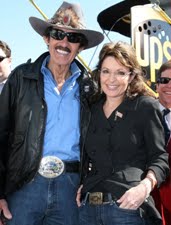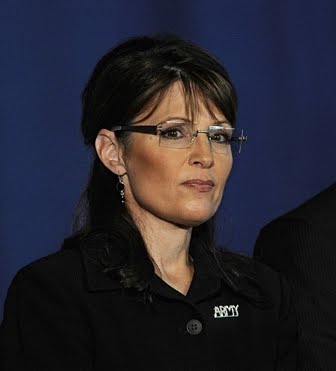 The Washington Post has an article up about a Palin magazine:
The Washington Post has an article up about a Palin magazine:Retailing for $8.99, the 100-page glossy magazine, titled "Sarah Palin: Faith, Family, Freedom," hit newsstands in mid-January and was jointly published by a fashion-publishing subsidiary of international marketing firm IMG and Imagine That Publishing. It will remain on sale through April 30.PatrickinOH is supposed to be shipping me one. I haven't seen them around here. Now I'm all excited. :)
"The genesis of it was really simple," said Steve LeGrice, the publisher and editor of Imagine That. "We're up here in New York, and there was clearly this huge enthusiasm for Sarah Palin, and at the same time all the people in the media world were sitting around scratching their heads" about how people could support her.
"What we decided to do is put out a magazine all in her own words," he said -- a magazine "without any opinion or anything added in. This is an independent project," said LeGrice, who has never met Palin but says he "would very much like" to. "We are not endorsed by her at all...."
The Palin issue contains what LeGrice said are family pictures of Palin not previously published by a magazine -- including her as a child with her siblings and a dead bear bleeding over a stump; picking through shot white birds; holding a cardboard box of fish freshly caught at an ice hole; and with moose antlers still attached to a fragment of bloody skull.
It also shows her as cute and chubby little girl with glasses, the lone brunette among three blond siblings...
LeGrice said the childhood and family photos were obtained from private sources by a photo editor. A spokeswoman for Palin declined to comment.
The volume's print run is "in the hundreds of thousands" and "a substantial number," LeGrice said -- and it has been selling well.

Okay, now on to some more serious stuff. A report shows that although the oil companies are whining about their high tax rates, ConocoPhilips was more profitable in Alaska than anywhere else in the country under Palin's tax system. Excerpts from article in the Juneau Empire:
--------------
The companies have said high taxes are driving away investment, but they may be doing better in Alaska than they're letting on, however.
ConocoPhillips Co. data for 2009 released last week revealed that the company was highly profitable in Alaska but lost money elsewhere in the country....The state's other two major oil producers, BP and ExxonMobil Corp. haven't filed details about their Alaska operations.
For 2009, ConocoPhillips reported profits of $1.54 billion for its Alaska exploration and production operations, compared to a loss of $37 million for those operations elsewhere in the nation.
Other company operations, including refining and marketing, corporate overhead, chemicals and emerging businesses combined with the Alaska operations for a total company profit of $5.3 billion.
"It sounds like they're doing pretty well in Alaska, compared to the rest of the country," said House Minority Leader Rep. Beth Kerttula, D-Juneau. "It is amazing how they try to tell us one thing, while their own reports show something else," she said.
Kerttula led House Democrats who allied in recent years with former Gov. Sarah Palin and some Republicans to revamp Alaska's oil taxes with the Alaska's Clear and Equitable Share act.
Brian Wenzel, ConocoPhillips' Vice-President of Finance for Alaska operations, said the profit disparity between Alaska and elsewhere in the United States were primarily due to the plunge in natural gas prices down south.....
Rep. Craig Johnson, R-Anchorage has introduced a bill for progressive taxing, where taxes increase along with oil prices.
It is that upside potential that oil companies bet on, spending money to drill new wells with the hope that they'll pay off big when oil prices rise, Helene Harding, ConocoPhillips' vice-president for Alaska North Slope Operations and Development said last fall.
Speaking to the Resource Development Council in Anchorage, Harding said that's the payday companies hope for when they decide where to invest their dollars. And that's what Alaska's tax reforms eliminated, she said.
"You take away the upside, (and) it is extremely hard to compete for dollars,' she said.
Department of Revenue Petroleum Economist Cherie Nienhaus said the state's tax law was intended to reduce oil taxes when prices decline to ensure Alaska remains a profitable place for business.
"I'm not surprised they are profitable despite the oil price decline, that's the way it was intended to work," she said.
Rep. David Guttenberg, D-Fairbanks, doubted reducing taxes would spur new development.
Under the old Economic Limit Factor tax system, many productive fields paid little or no tax regardless of development, he said.
"What economic development did they do when it was basically not taxed at all?" Guttenberg said.
----------
And the debate rages on.



















No comments:
Post a Comment